




Dear Colleagues,
FY 2023 has been an incredible year of accomplishments for our data science community, DISC team, members, and affiliates. The DISC community continues to grow and become more active!
During FY 2023, we have hosted a variety of events to connect the OU community within and beyond OU. Our Communities of Practice have been growing to propose innovative approaches to challenging, important problems. The DISC team has been instrumental in supporting proposal submissions to various agencies and data science researchers across campus are continuing to grow their research. The new data science and dataenabled research grants awarded are growing rapidly. Many exciting projects are starting that will create extensive opportunities, and now, we have created two separate programs for postdoctoral researchers and graduate students.
This end-of-the-year report will provide an overview of what the data science community, DISC team, members, and affiliated have accomplished in FY 2023.
We look forward to your continued support and partnership in making OU a nationally-recognized leader for data science research and data-driven solutions to solve important challenges that impact our society in FY24. As always, please feel free to reach out to our team if you need assistance in your research work or are interested in learning how our team can help advance your research.
Sincerely,
Dr. David S. Ebert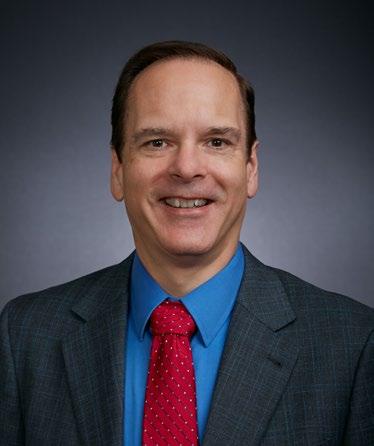
 Gallogly Chair Professor of Electrical and Computer Engineering and Computer Science, Associate Vice President of Research and Partnerships, Director, Data Institute for Societal Challenges (DISC) University of Oklahoma
Gallogly Chair Professor of Electrical and Computer Engineering and Computer Science, Associate Vice President of Research and Partnerships, Director, Data Institute for Societal Challenges (DISC) University of Oklahoma
Empower transdisciplinary research and collaboration to drive convergent solutions to societal challenges in Oklahoma, the nation, and the world through data science research, tools, and capabilities.
The University of Oklahoma is a nationally recognized leader for data science research and data-driven solutions to societal challenges.
Collaboration – Together, we are more effective in solving challenges.
Innovation – Create new techniques, tools, and data-enabled solutions to positively impact our global community.
Inclusivity – Integrate diverse teams, education, research, and engagement with partners.
Trust – Through our actions, we build trust – core to transdisciplinary team success, transition to societal impact, and sustainability.
Empowerment – Empower convergent research teams to solve societal challenges.
Research Network - Develop, sustain, and grow a robust and transdisciplinary network of diverse OU researchers while enhancing convergent research accessibility, quality, diversity, and competitiveness.
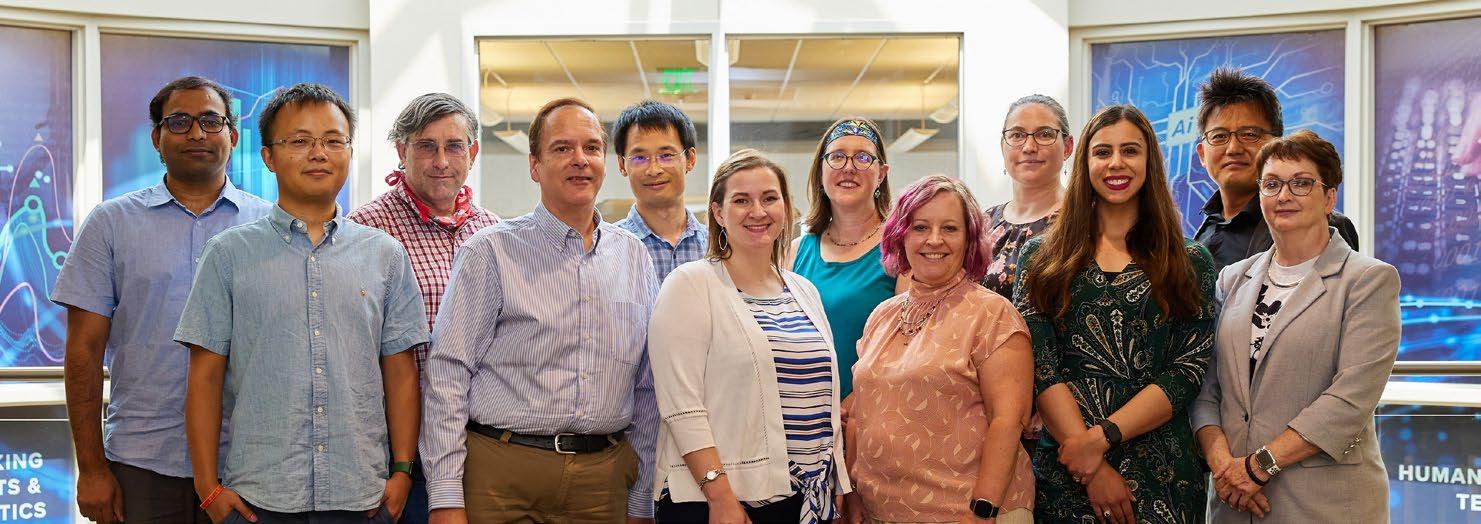
External Partners - Establish relationships and partnerships with external researchers, scholars, and industry leaders to address societal challenges using data science tools.
Financial - Build a growing and sustainable financial foundation that will support the institute’s operations and increase the amount and quality of data-enabled research at OU.
Capabilities - Partner with stakeholders across OU to identify, build, and provide the necessary data science capabilities and infrastructure to effectively lead and support data science research.
Data Science Leader - Be nationally recognized as a leader in data science and data-enabled science by accelerating and advancing emerging research in data science, engineering, science, and creative activities driven by real-world applications.
Director
David Ebert
Sr. Assoc. Director
Erin Maher
Faculty Fellows
Jeong-Nam Kim
Caroline T. Schroder
Chongle Pan Yifu Li
Software Developer
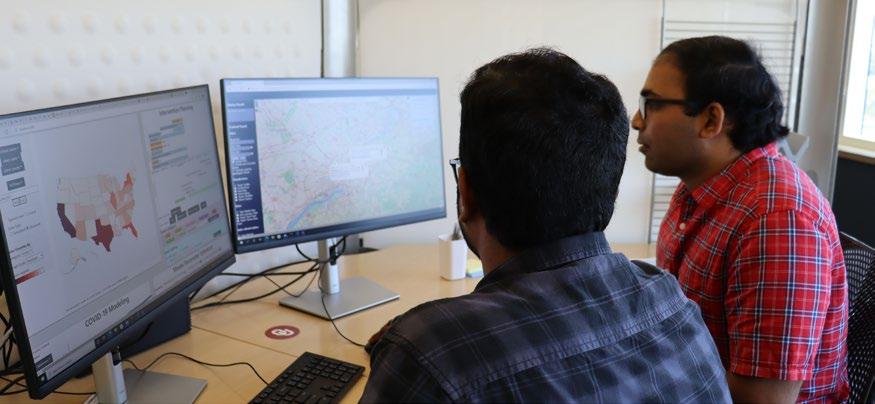
Mahamoud Mousa Hamad
Research Associates
Gopichandh “Gopi” Danala
Wolfgang Jentner
Undergradute Research Assistants
Mohamed Abdelnaby
Usman A. Syed
Vincent Tran
Nondumiso Mndzebele
Jack Wagner
Parker Fikes
Kashaf Mujeeb
Managing Director
Yessenia Torres
Assoc. Directors
Jennifer Koch
Andrew Fagg
Assistant to the Assoc. VPRP/Director of DISC
Laurie Hurley
Admin. Support Specialist
Zoe Tufford
Graduate Research Assistants
Mehreen Habib
Jacob Sturges
Aseel Basheer
Catherine Donner
Parisa Masnadi Khiabani
Gnaneswar Kolla
Marc Hanna
Jessica Shaw
Designed to help researchers, students, and staff connect across disciplines and facilitate team-building and partnerships at OU.
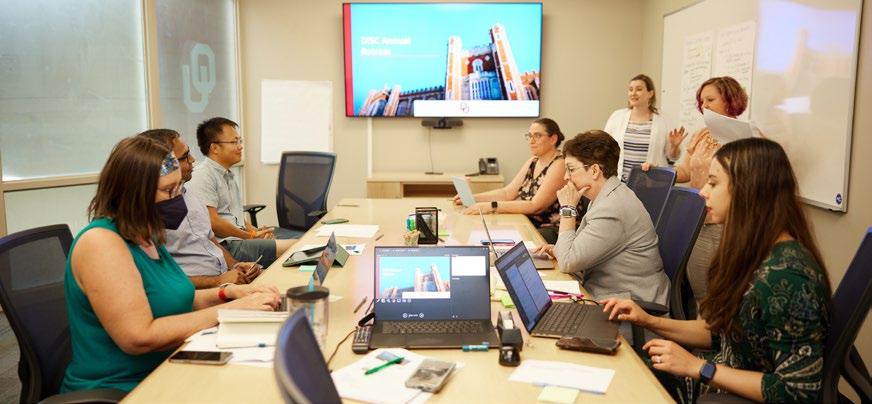
In FY23 we had:
This is an increase of 200% and 132%, respectively, from FY22. To learn about more becoming a member or affiliate, visit: ou.edu/ disc/about/people/data-science-community
DISC, in partnership with other centers and institutes, has hosted a variety of research creative activities. These activities provide an opportunity for faculty/researchers to meet new colleagues and share research interests or expertise. Example activities include guest speakers, teaming workshops, community engagement events, and many others.
In FY23:
56 Total Workshops/ Events Co-Hosted
1,524 Cumulative Workshop Attendance
DISC plays an integral role in supporting externally-funded research across OU.
M $
M
DISC expanded its research seed funding program in FY23. Now, we have opportunities available for both postdoctoral researchers and graduate students in addition to faculty. Many OU researchers have benefitted from this opportunity. For example, one team created a VR application that is going to be demoed at an upcoming Construct3D conference. Another team was able to enhance existing explainable AI and machine learning clustering algorithms to better suit social science survey datasets. In addition, one team was awarded a Department of Defense grant as the seed funding provided by DISC facilitated a strong collaborative background between the labs.
DISC seed funding allowed OU researchers in FY23 to:
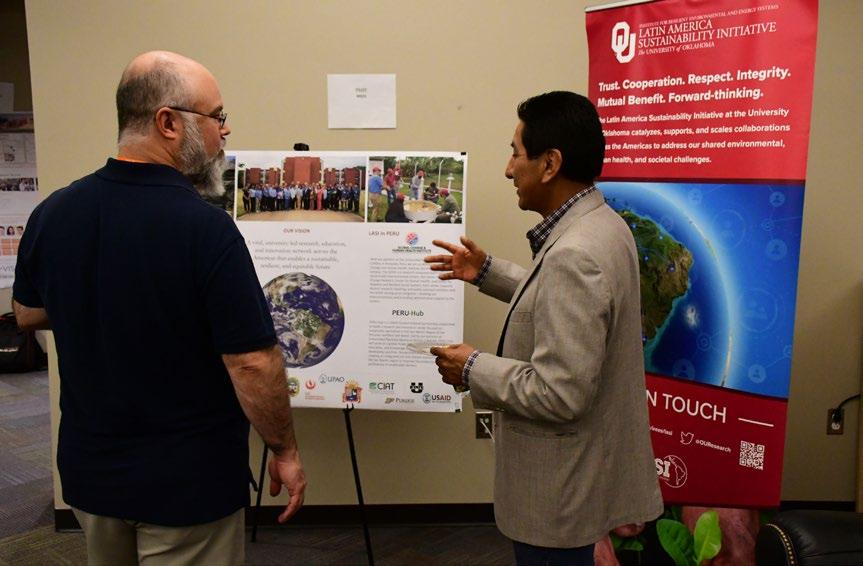
• Host workshops
• Hire and provide graduate students with valuable professional and pedagogical skills
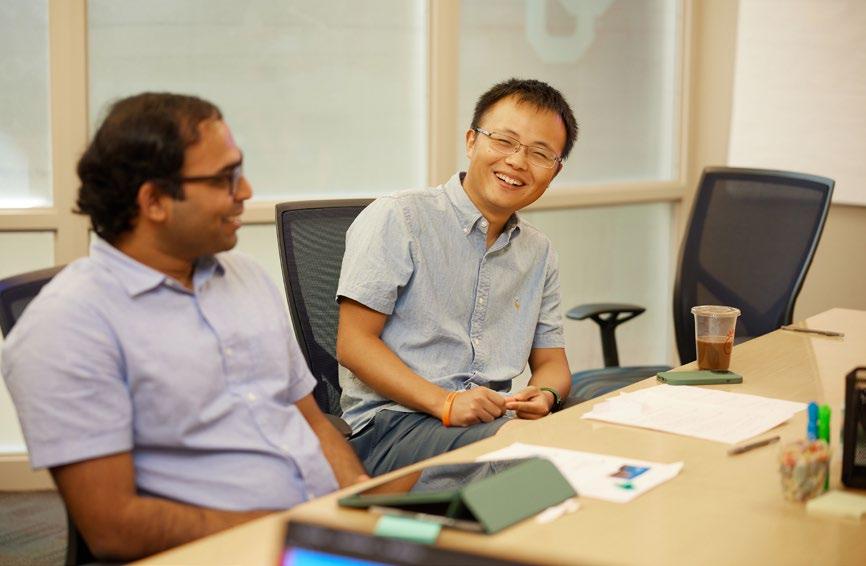
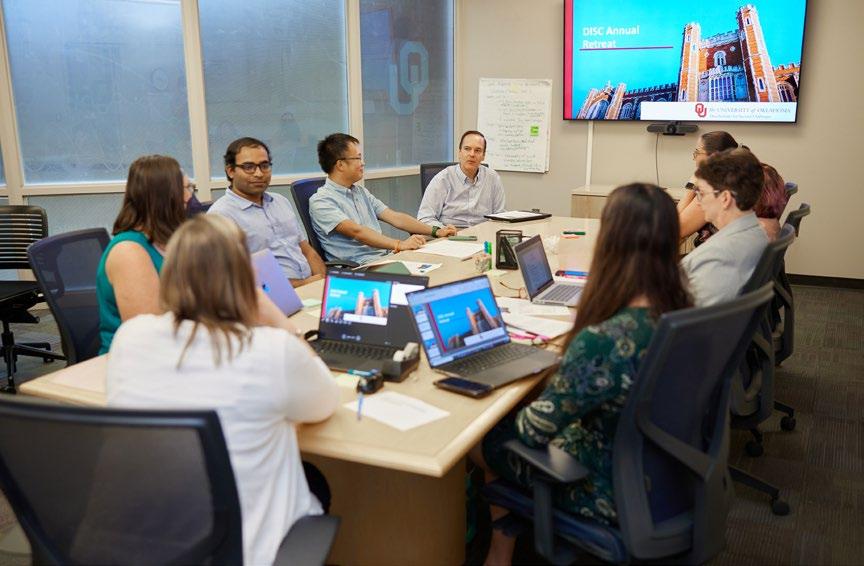
• Acquire equipment necessary for data collection
• Apply for external funding from agencies such as National Science Foundation, Department of Energy, Department of Defense, Health and Human Services
• Present findings at conferences
FY23
Funding Awards Recap
$215.4K 29 TEAMS 79 RESEARCHERS
Project Title
The Interaction between Virtual Multi-Sensory Environments and Children with Intellectual and Developmental Disabilities in Central Oklahoma
Spatially Explicit Delineation for Boundaries of Social-Environmental Systems: A Case in the Rio Grande - Rio Bravo basin
Implementing an automated, high-resolution tracking system to reveal social network dynamics in a socially gregarious songbird
Developing a Novel Methodology in R for Mapping Biometric Data onto Architectural Floorplans
An Improved Data Science Application to Support Operational Disease Forecasting
The Water-saving Potential of Sprinkler Irrigation Systems Across Winter Wheat Farms in Oklahoma
Towards a Robust Active Learning Workflow for Machine Learning Assisted Free Energy Simulation of Enzyme Reactions
Leveraging Machine Learning and Weather Radar to Identify Changes in Bat Migration and Implications for Pathogen Dispersal
Integrating Multiple Datasets to Develop a Historical Comprehensive Hourly Urban Weather Database (CHUWD) for Energy System Modeling
Applying Micro-Level Data to Estimate the Economic Value of HazardRelated Information
Essential yet Disposable: Confronting Data Challenges for Studying Refugee and Immigrant Workers During COVID-19
Nanocrystalline Transition Metal Oxides for a New Generation of Lithium-Ion Batteries
Team Members
Amount Awarded
Nega Heidari Matin, Anna Nguyen, Ye Ji Yi $10,000
Selena Feng, Jennifer Koch $10,000
Alexandra Bentz, Golnaz Habibi, Eli Bridge $10,000
Angela Person, Chris Black $7,500
Mike Wimberly $10,000
Nishan Bhattarai, Pradeep Wagle $10,000
Yihan Shao $10,000
Daniel Becker, Amy McGovern, Eli Bridge, Jeff Kelly, Jeremy Ross $10,000
Chenghao Wang $10,000
Jayash Paudel, Kim Klockow-McClain, Justin E. Sharpe $7,500
Annabel Ipsen $7,500
Wilson MerchanMerchan, Jie Cai, Mrinal C. Saha, Bin Xu, Dong Zhang $10,000
Pilot Study to Investigate a Systematic Framework to Improve Data Quality for a National Child Welfare Database
Yutian Thompson, Hairong Song, David Bard, Jane Silovsky, Jonathan Picklesimer, Yaqi Li
Amount Awarded
$10,000
Availability of Electric Vehicle (EV) Charging Stations and EV Adoption Rate
Interactive Visual Analytics Framework for Identifying Unique Motifs in Cas9 Protein Sequences
Kwangyul Choi, Anni Yang $10,000
Ji Hwan Park, Rakhi Rajan $7,000
Asian Immigrants' Diabetes Disparity
Examining the Role of Large-Scale Language Models and Prompt Engineering in Enhancing Department of Defense Supply Chain Readiness
Yong-Mi Kim, Sunny Kim, Suchismita Bhattacharjee, June Abbas, Sailatha Thomas, Pranay Kathuria, Insung Kim
$10,000
Interweaving Hydrology and Indigenous Knowledge for Flood-related Environmental Justice with the Otoe-Missouria Tribe
Naveen Kumar, Pankhuri Malhotra $14,000
Farina King, Yang Hong, Allen Li, Mengye Chen, Chengbin Deng,Theresa Tsoodle
$10,000 from DISC
$20,000 from ICAST
Leveraging Big Data to Improve Quality in Infants’ and Toddlers’ Language Learning Environments
Wonkyung Jang, Diane Horm, Ryan Kasak, Kun Lu, Ji Hwan Park, KyongAh Kwon
$10,000 from DISC
$20,000 from ICAST
Assessing the knowledge, awareness, and perception of micro, small, and medium enterprises (MSMEs) on renewable energy technologies in Nigeria: A paradigm shift in energy education.
Trends In Adolescent Suicide Attempts During The Onset Of A Global Pandemic, And The Protective Factors Of School Based Socialization
Synthesizing Graduate Student Research with Global Climate Science Priorities
Urban Landscape: Eco-Social Interactions and Park Configurations Influencing Human Exposure to Ticks in Oklahoma City
Facilitating Gradient Student Involvement in the CODE Workshop
With Our Own Eyes: Using Photovoice for Youth in Foster Care to Understand Aspirations
Mass spectrometry profiling of metabolite distribution and spatial clustering of metabolomics data in Chagas disease
Bat immunology across taxonomy, ecology, and infections using comparative proteomics
Quantifying bat cellular immunity under multiple stressors in western North America
Our Communities of Practice (CoPs) are designed to bring together researchers across the University of Oklahoma who share a common interest and come together to brainstorm possible solutions to address societal challenges. In FY23, many of our CoPs hosted a variety of engagement opportunities for the OU community. Below you will find a snapshot of the activities accomplished. Be in the lookout for opportunities to be involved in FY24!
This CoP is led by Dr. Andy Fagg and is focused on the neural control of human behavior, and how the neuromotor systems change with learning, development, disease onset, injury, recovery, and therapeutic interventions. This group includes experts in brain imaging (including EEG and fNIRS), psychology, systems neuroscience, human motor control, rehabilitation sciences, motion capture (including kinematics, kinetics, and EMG), neural modeling, and high-dimensional data analysis.
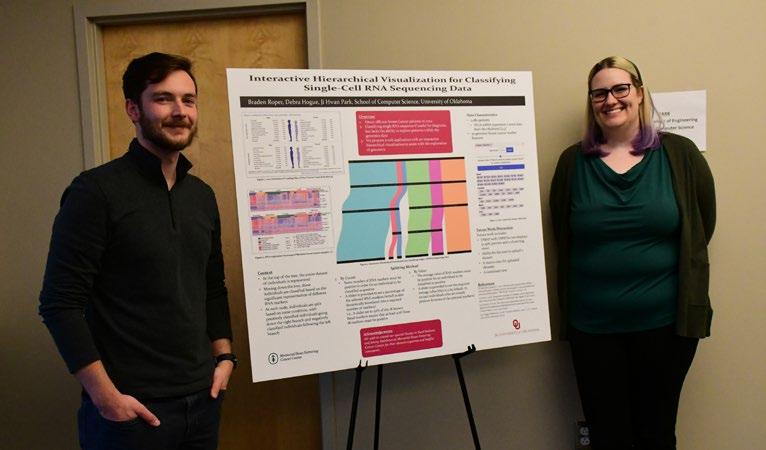
This CoP is led by Dr. Jennifer Koch with the goal of developing research ideas with a focus on environmental systems observation and modeling. More specifically, this group brings together researchers working on understanding processes in the biosphere, geosphere, hydrosphere, atmosphere, and their linkages. In our conversations, we apply a systems approach, identify synergies and shared research interests around the broader topics of environmental systems science, observation and prediction of environmental systems, and work towards describing these ideas and synergies in onepage summaries. One of the underlying motivations is to be prepared for emerging funding opportunities and to reach out to program managers of potential funding agencies. More opportunities to engage with this community of practice will be coming in FY24.

This CoP is led by Drs. Carrie Schroeder and Kimberly Marshall to bring together people who work in digital humanities or would like to engage in digital humanities work to foster collaboration. This group had a successful year with several initiatives that brought together researchers from multiple units at OU. In the fall, we had a meet-and-greet with the Associate Dean for Digital Strategies and Innovation, OU Libraries, and shared with her the needs and capacities of OU’s DH community. Our lecture and workshop by Dr. Roopika Risam of Dartmouth University inspired several of our members who are developing grant proposals. At the end of the year, our three seed grant awardees from the previous year shared the results of their research. In addition, this year several members of the CoP were awarded National Endowment for the Humanities grants for digital or data-related projects.
This CoP is led by Dr. Andy Fagg and focused on developing deeper research and educational connections between the Department of Neurosciences on the OU Health Sciences Campus and those working at OU-Norman. Faculty and other researchers in this group work at many levels – from cellular systems to system neuroscience and musculo-skeletal systems.
This CoP is led by Dr. Erin Maher with the goal of keeping abreast of opportunities for opioid-related funding, sharing ongoing research to foster collaboration and expansion of the research, and, ultimately, using research to develop and implement solutions. In Spring 2023, the Opioid Research Group hosted an OU-wide presentation by the Southwest Prevention Center at OU Outreach. The presenters discussed their federally and state-funded research to prevent substance use disorders. New collaborations were pursued.
This CoP is led by Drs. Joy Pendley from the Center of Faculty Excellence and David Ebert and emphasizes community engagement for OU researchers, educators, and scholars across campuses and disciplines. The goal of this CoP is to provide opportunities for faculty and staff to interact with community partners (primarily in the Norman and OKC areas) who have a variety of data, service learning, and infrastructure needs. Future opportunities will be forthcoming in FY24.
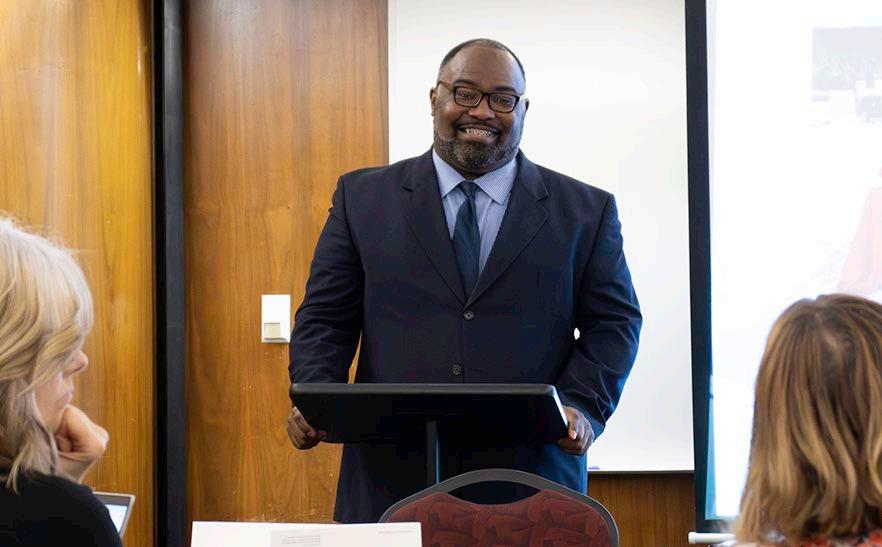
This CoP is led by Drs. Chongle Pan and Andy Fagg with the goal of developing a research and learning community across OU Norman, OUHSC, and OMRF that focuses on bioinformatics, computational biology, and biomedical data science. To date, DISC has organized a number of research discussions and provided regular tutorials on machine learning and the use of the OU supercomputer facilities. The Bioinformatics CoP held multiple meetings with their current members this year and a mini-symposium. The event showcased current work in the single-cell omics field and provided an overview of advanced computational approaches for omics, with the objective of fostering collaboration, increasing understanding of cutting-edge tools, and exploring opportunities to strengthen the bioinformatics and computational workforce supporting research across the university.
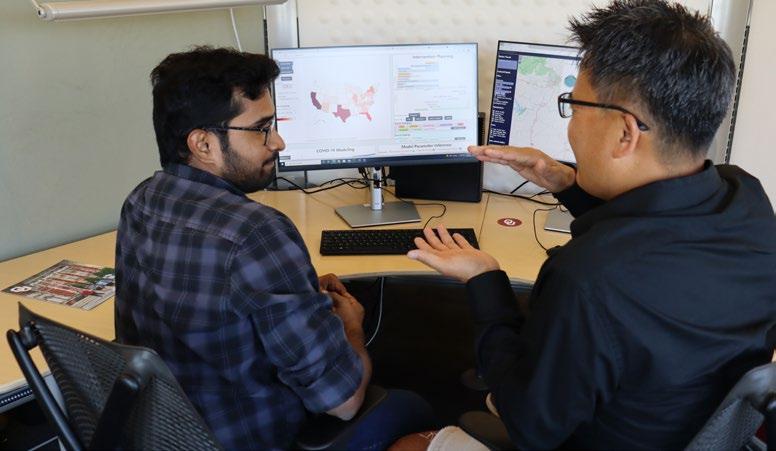
This CoP is led by Dr. Heather Bedle and brings together a multidisciplinary group of researchers from the undergraduate to faculty level who want to explore how machine learning can be used in conjunction with traditional statistical methods for data analysis of datasets that span the social and natural sciences. This is the newest CoP, and engagement opportunities will be available in FY24.
This CoP is led by Dr. Andrés González and is working to enhance the understanding, design, and resilience of supply chains and supply-demand networks. In today’s world, supply chains are highly interconnected, and their proper operation is affected by diverse types of hazards, both natural (e.g., pandemics, earthquakes, floods, or climate-change induced events) and anthropogenic (e.g., attacks to physical and/or cyber infrastructure). During FY23, this CoP brought together researchers across campus to learn about the challenges facing the Department of Defense. Specifically, the senior leadership of the 448th Supply Chain Management Wing from Tinker Air Force Base visited OU on May 3, 2022 and provided an overview of their geographically dispersed mission as the U.S. Air Force’s sole organization responsible for the wholesale supply chain network.
This CoP is led by Kristi Wyatt and works to bring together researchers who work with 3D data. The 3D Workflow Community of Practice kicked off in the FY22 with a campus-wide survey assessing who was interested in using or already using 3D data. It also looked at how 3D data was created, what it was used for, and the challenges faced when using and or creating it. During the first Meet and Greet event, attendees were able to network and discuss their research using 3D data. During FY23, a workshop was held in collaboration with the Office of Digital Learning, where attendees learned how to share their 3D models on their OUCreate sites using the 3DHOP web-plugin.
Reach out to disc@ou.edu for questions or more information about how to get stared.
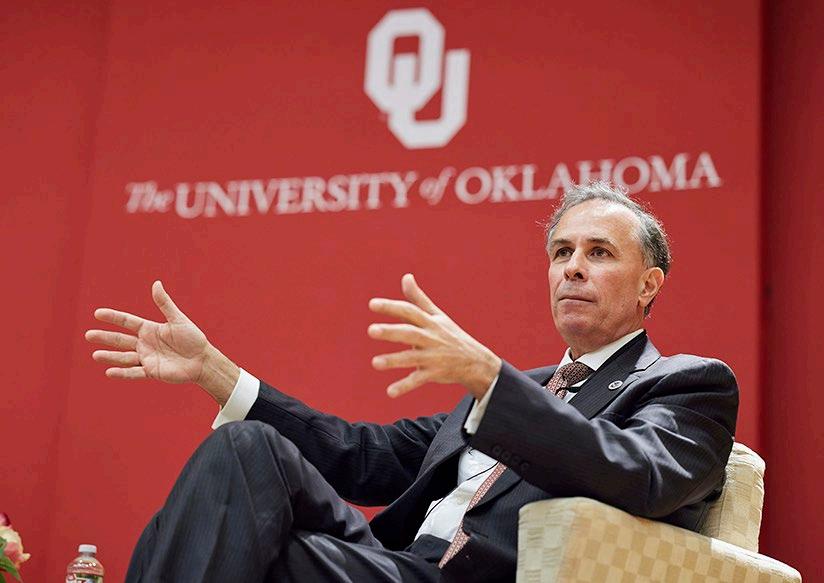
Dr. Dimitri Kusnezov, the Undersecretary for the Science and Technology Directorate at the U.S. Department of Homeland Security, visited OU for a two-day engagement in Feb. 2023. The event brought together the OU community, industry leaders, tribal nation partners, and other prominent leaders in Oklahoma. A townhall and fireside chat was hosted at the Sam Noble Museum of Natural History, during which Dr. Kusnezov discussed ways to drive innovation, engage the nation’s full ecosystem, and address future challenges of homeland security.
For over a decade, the Coptic Scriptorium project has developed open access, online resources for Coptic Language and literature. The Coptic language is the last phase of the Egyptian language family, a direct descendant of the hieroglyphs of ancient Egypt. Coptic texts and the study of Coptic linguistics are important for multiple academic disciplines and for the heritage community of Coptic Orthodox Christians who use the language for liturgy and their cultural identity.
This Humanities Collections and Reference Resources Implementation grant, led by Carrie Schroeder (PI and primary grantwriter) and Amir Zeldes (co-PI, Georgetown University), will enable the project to improve the user experience, to expand a digital database of richly annotated texts in the classical dialect of the language, and to develop natural language tools and searchable, annotated, digitized corpora for additional dialect.
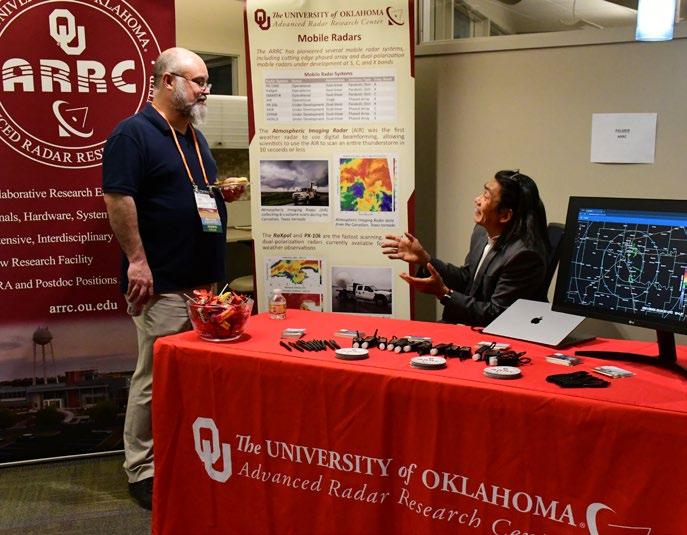
More than 100 volunteers and attendees participated in an OU Open House event comprised of a series of tours around campus hosted by DISC on October 20, 2022. The Open House was an optional tour held in conjunction with the IEEE Vis conference held Oct. 17-21 in Oklahoma City. The conference convened more than 1,300 in-person and virtual attendees from around the world – researchers and practitioners from universities, government, and industry to exchange recent findings on the design and use of visualization tools and to discuss theory, methods, and applications of visualization and visual analytics.
OU faculty, staff, and students can now download NVivo, a qualitative data analysis computer software package, for free thanks to a partnership between DISC, the Office of the Vice President of Research and Partnerships, and the Institute for Community and Society Transformation. The NVivo software allows users to import and organize a wide range of data, including text documents, images, audio and video clips, and more.
The University of Oklahoma and two South Korean institutes have signed memorandums of understanding to facilitate collaborative research to solve societal challenges in data science, data-enabled science, public policy and strategic communication, and to develop data science informed policy intervention for Asia-specific and global problems. These agreements bring together faculty and student researchers from OU, coordinated by DISC, with those from the Moon Soul Graduate School of Future Strategy at the Korea Advanced Institute of Science and Technology (KAIST) and Sejong University.
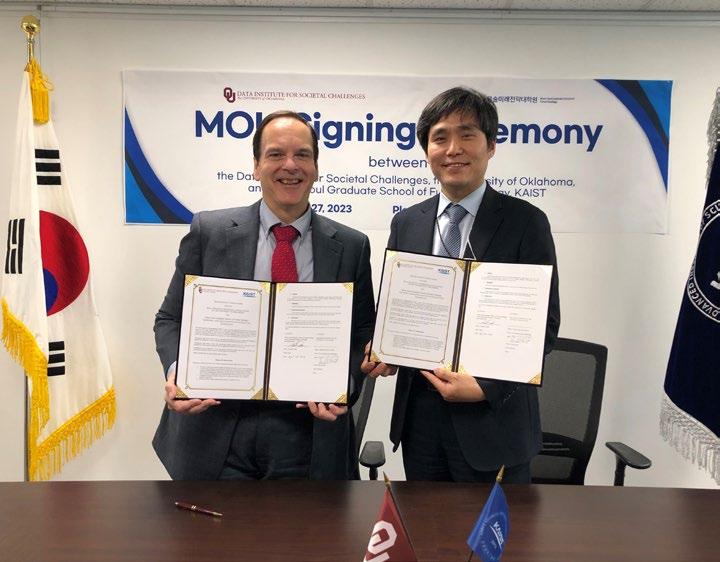
Dr. Andy Fagg, provided a variety of machine learning training opportunities to the OU community over the past year. These include:
• Introduction to deep learning and its use on the OU supercomputer (live and recorded tutorials).
• A full set of videos on applying conventional machine learning techniques to a wide range of problem types and data sets.
• Multi-part tutorial on 1D and 2D Transformer Models (a subset of deep learning) for classification and generation of content (live and recorded).
• A tutorial on optimizing deep learning models on the OU supercomputer (and others).
To view these tutorials, visit ou.edu/disc/resources/supercomputer-and-machine-learning-tutorials
With funding from the OU Vice President for Research, the Data Institute for Societal Challenges has acquired a set of CPU and GPU nodes for the OSCER Supercomputer, as well as large-scale storage on OURdisk. These resources are available for use by all members of DISC who are located on the OU campuses, including: faculty, researchers, postdocs, and students.
Apply for access to the DISC supercomputer resources
Ahmed, S. E., San, O., Lakshmivarahan, S., & Lewis, J. M. (2023). On the dual advantage of placing observations through forward sensitivity analysis. arXiv preprint arXiv:2305.00300 https://arxiv.org/pdf/2305.00300
Almoghathawi, Y., Selim, S., & Barker, K. (2023). Community structure recovery optimization for partial disruption, functionality, and restoration in interdependent networks. Reliability Engineering & System Safety, 229, 108853. https://www.sciencedirect.com/science/article/pii/S0951832022004707
Badré, A., & Pan, C. (2023). Explainable multi-task learning improves the parallel estimation of polygenic risk scores for many diseases through shared genetic basis. PLOS Computational Biology, 19(7), e1011211. https://pubmed.ncbi.nlm.nih. gov/37418352/
Bedle, H., Garneau, C. R., & Vera-Arroyo, A. (2023). Clustering energy support beliefs to reveal unique sub-populations using self-organizing maps. Heliyon. https://www.cell.com/heliyon/pdf/S2405-8440(23)05559-7.pdf
Bedle, H., Salazar-Florez, D., & Garneau, C. R. (2022). Recognizing societal influences in earthquake geohazard risk perception with explainable AI while mitigating risks through improved seismic interpretation. The Leading Edge, 41(11), 756-767. https://mcee.ou.edu/aaspi/publications/2022/Bedle_et_al_2022-Recognizing_societal_influences_in_ earthquake_risk_perception_through_improved_seismic_interpretation.pdf
Bourgeois, C.M., L. Soltanisehat, K. Barker, & A.D. González. (2023). Inventory Scheduling Framework to Fulfill Multi-product Orders within a Production Network. Computers and Industrial Engineering, 182: 109343. https://www.sciencedirect.com/ science/article/pii/S0360835223003674
Chapman, H. S., Hanson, M. C., Dzutsati, V., & DeBell, P. (2023). Under the Veil of Democracy: What Do People Mean When They Say They Support Democracy?. Perspectives on Politics, 1-19. https://www.cambridge.org/core/services/aopcambridge-core/content/view/CF9077ABA3B0B61823757DD01BB00298/S1537592722004157a.pdf/div-class-titleunder-the-veil-of-democracy-what-do-people-mean-when-they-say-they-support-democracy-div.pdf
Chen, L., Cheng, S., Stankovic, V., Stankovic, L., & Shi, Q. (2022). How likely is a random network graph shift-enabled?. IEEE Transactions on Signal and Information Processing over Networks, 8, 973-982. https://ieeexplore.ieee.org/ iel7/6884276/9666472/09975143.pdf
Chiu, M. M., Morakhovski, A., Ebert, D., Reinert, A., & Snyder, L. S. (2023). Detecting COVID-19 fake news on Twitter: Followers, emotions, relationships, and uncertainty. American Behavioral Scientist, 00027642231174329. https://journals. sagepub.com/doi/pdf/10.1177/00027642231174329
Connelly, S. E., Maher, E. J., & Pharris, A. B. (2022). Playing to Succeed: The Impact of Extracurricular Activity Participation on Academic Achievement for Youth Involved with the Child Welfare System. Child and Adolescent Social Work Journal, 1-15. https://link.springer.com/article/10.1007/s10560-022-00897-7
Cui, Y., Li, Y., Pan, C., Brown, S. R., Gallant, R. E., & Zhu, R. (2023). Bayesian inference for survival prediction of childhood Leukemia. Computers in Biology and Medicine, 156, 106713. https://pubmed.ncbi.nlm.nih.gov/36863191/
Dean, D. A., Roach, J., vonBargen, R. U., Xiong, Y., Kane, S. S., Klechka, L., Wheeler, K., Sandoval, M. J., Lesani, M., Hossain, E., Katemauswa, M., Schaefer, M., Harris, M., Barron, S., Liu, Z., Pan, C., & McCall, L. I. (2023). Persistent biofluid small molecule alterations induced by Trypanosoma cruzi infection are not restored by antiparasitic treatment. bioRxiv : the preprint server for biology, 2023.06.03.543565. https://www.biorxiv.org/content/10.1101/2023.06.03.543565.full.pdf
Demir, F. (2022). IMF conditionality, export structure and economic complexity: The ineffectiveness of structural adjustment programs. Journal of Comparative Economics, 50(3), 750-767. https://firatdemir.oucreate.com/Demir_ JCE2022_Structural_Adjustment_Trade_Structure_Appendix.pdf
Demir, F., & Duan, Y. (2020). Target at the right level: Aid, spillovers and growth in sub-saharan Africa. Target at the Right Level: Aid, Spillovers and Growth in Sub-saharan Africa. http://firatdemir.oucreate.com/Demir_Duan_Aid_growth_ spillovers.pdf
Demir, F., & Hu, C. (2022). Institutional similarity, firm heterogeneity and export sophistication. The World Economy, 45(4), 1213-1241. https://firatdemir.oucreate.com/Demir_Hu_Institutions_and_Export%20Sophistication.pdf
Demir, F., Hu, C., Liu, J., & Shen, H. (2022). Local corruption, total factor productivity and firm heterogeneity: Empirical evidence from Chinese manufacturing firms. World Development, 151, 105770. https://www.sciencedirect.com/science/ article/pii/S0305750X21003855
Demir, F., & Lee, S. (2022). Foreign direct investment, capital accumulation, and growth: The rise of the Emerging South. International Review of Economics & Finance, 80, 779-794. https://doi.org/10.1016/j.iref.2022.02.044
Demir, F., & Razmi, A. (2022). The real exchange rate and development theory, evidence, issues and challenges. Journal of Economic Surveys, 36(2), 386-428. https://doi.org/10.1111/joes.12418
Demir, F., & Tabrizy, S. S. (2022). Gendered effects of sanctions on manufacturing employment: Evidence from Iran. Review of Development Economics, 26(4), 2040-2069. https://onlinelibrary.wiley.com/doi/abs/10.1111/rode.12917
Feng, S., Ji, H. L., Wang, H., Zhang, B., Sterzenbach, R., Pan, C., & Guo, X. (2022). MetaLP: An integrative linear programming method for protein inference in metaproteomics. PLOS Computational Biology, 18(10), e1010603. https://journals.plos.org/ ploscompbiol/article?id=10.1371/journal.pcbi.1010603
Ferraro, A. C., Maher, E. J., & Grinnell-Davis, C. (2022). Family ties: A quasi-experimental approach to estimate the impact of kinship care on child well-being. Children and Youth Services Review, 137, 106472. https://www.sciencedirect.com/ science/article/pii/S0190740922001086
Han, D., Mulyana, B., Stankovic, V., & Cheng, S. (2023). A Survey on Deep Reinforcement Learning Algorithms for Robotic Manipulation. Sensors, 23(7), 3762. https://www.mdpi.com/1424-8220/23/7/3762/pdf
Jamalzadeh, S., Barker, K., González, A. D., & Radhakrishnan, S. (2022). Protecting infrastructure performance from disinformation attacks. Scientific Reports, 12(1), 12707. https://www.nature.com/articles/s41598-022-16832-w
Karakoc, D. B., Barker, K., & González, A. D. (2023). Analyzing the tradeoff between vulnerability and recoverability investments for interdependent infrastructure networks. Socio-Economic Planning Sciences, 87, 101508. https://www. sciencedirect.com/science/article/abs/pii/S0038012123000010
Lewis, J. M., & Lakshmivarahan, S. (2022). Role of the Observability Gramian in Parameter Estimation: Application to Nonchaotic and Chaotic Systems via the Forward Sensitivity Method. Atmosphere, 13(10), 1647 https://www.mdpi. com/2073-4433/13/10/1647/htm
Li J, Pan C, Guo X. (2022). IDIA: An Integrative Signal Extractor for Data-Independent Acquisition Proteomics. Proceedings (IEEE Int Conf Bioinformatics Biomed). 2022:266-269. doi:10.1109/bibm55620.2022.9994873. https:// pubmed.ncbi.nlm.nih.gov/37034305/
Pharris, A. B., Lepper-Pappan, H., Maher, E., & Natale, A. P. (2023). The caseworker as an external locus of hope for LGB youth in foster care. Journal of Public Child Welfare, 1-20. https://doi.org/10.1080/15548732.2023.2193141
Rocco, C. M., Nock, D., & Barker, K. (2023). A Fairness-Based Approach to Network Restoration. IEEE Transactions on Systems, Man, and Cybernetics: Systems https://ieeexplore.ieee.org/document/10014676
Seshadri, A. K., & Lakshmivarahan, S. (2023). Invariants and chaos in the Volterra gyrostat without energy conservation. Chaos, Solitons & Fractals, 173, 113638. https://www.sciencedirect.com/science/article/abs/pii/S0960077923005398
Shotande, M. O., Veirs, K. P., Day, J. D., Ertl, W. J., Fagg, A. H., & Dionne, C. P. (2022). Comparing Temporospatial Performance During Brisk and Self-Paced Walking by Men With Osteomyoplastic Transfemoral Amputation and Controls Using Pressure and Muscle Activation Peak Times. Frontiers in Rehabilitation Sciences, 3, 848657. https://www.frontiersin. org/articles/10.3389/fresc.2022.848657/full
Shotande, M. (2022). Modeling Relationships Between Brain/Muscle Activity and Locomotive Behavior. https://shareok. org/handle/11244/336923
Soltanisehat, L., A.D. González, and K. Barker. 2023. Modeling Social, Economic, and Health Perspectives for Optimal Pandemic Policy Decision-making. Socio-economic Planning Sciences, 86: 101472. https://www.sciencedirect.com/ science/article/abs/pii/S0038012122002737
Soltanisehat, L., Barker, K., & González, A. D. (2023). Multiregional, multi-industry impacts of fairness on pandemic policies. Risk Analysis https://onlinelibrary.wiley.com/doi/10.1111/risa.14143?af=R
Wang, S., Feng, S., Pan, C., & Guo, X. (2022). FineFDR: Fine-grained Taxonomy-specific False Discovery Rates Control in Metaproteomics. In 2022 IEEE International Conference on Bioinformatics and Biomedicine (BIBM) (pp. 287-292). IEEE. https://pubmed.ncbi.nlm.nih.gov/36910011/
Wang, D., Hunt, K. A., Candry, P., Tao, X., Wofford, N. Q., Zhou, J., Mclenerney, M. J., Stahl, D. A., Tanner, R. S., Zhou, A., Winkler, M., & Pan, C. (2023). Cross-Feedings, Competition, and Positive and Negative Synergies in a Four-Species Synthetic Community for Anaerobic Degradation of Cellulose to Methane. Mbio, 14(2), e03189-22. https://pubmed.ncbi. nlm.nih.gov/36847519/
Wanyama, D., Wimberly, M. C., & Mensah, F. (2023). Patterns and drivers of disturbance in tropical forest reserves of southern Ghana. Environmental Research Letters, 18(6), 064022. https://doi.org/10.1088/1748-9326/acd399
Wimberly, M. C., Davis, J. K., Hildreth, M. B., & Clayton, J. L. (2022). Integrated forecasts based on public health surveillance and meteorological data predict West Nile virus in a high-risk region of North America. Environmental Health Perspectives, 130(8), 087006. https://doi.org/10.1289/EHP10287
Xiao, P., & Cheng, S. (2022). Bayesian Federated Neural Matching that Completes Full Information. arXiv preprint arXiv:2211.08010 https://arxiv.org/pdf/2211.08010
Xu, T., Tao, X., He, H., Kempher, M. L., Zhang, S., Liu, X., Wang, J. Wand, D., Ning, D. Pan, C., Ge, H., Zhang, N., He, Y., & Zhou, J. (2023). Functional and structural diversification of incomplete phosphotransferase system in cellulose-degrading clostridia. The ISME Journal, 17(6), 823-835. https://pubmed.ncbi.nlm.nih.gov/36899058/
Zhang, H., Cheng, S., El Amm, C., & Kim, J. (2023). Efficient Pooling Operator for 3D Morphable Models. IEEE Transactions on Visualization and Computer Graphics https://ieeexplore.ieee.org/iel7/2945/4359476/10068322.pdf
Zhao, J., Demir, F., Ghosh, P. K., Earley, A., & Kim, M. (2022). Reforming the countermeasures injury compensation program for COVID-19 and beyond: An economic perspective. Journal of Law and the Biosciences, 9(1), lsac008. https://academic. oup.com/jlb/article/9/1/lsac008/6555422
Zhao, Z., Zhao, S., & Cheng, S. (2022). Group ensemble block: subspace diversity improves coarse-to-fine image retrieval. IEEE Transactions on Artificial Intelligence, 4(1), 60-70. https://ieeexplore.ieee.org/iel7/9078688/9184921/09889202.pdf
DISC will continue its commitment to support the OU community to ensure that we position the university as a nationallyrecognized leader for data science research and data-driven solutions to societal challenges.
DISC will continue to fulfill our role as a partner in advancing data science and data-enabled research by:
• Empowering: Provide teams with the necessary tools and support to launch innovative research.
• Connecting: Encourage collaboration between faculty and other partners across synergistic fields, industries, and sectors.
• Leading: Pave the way for new methods, testing, and analysis by advancing data science, and data-enabled research techniques.
• Establishing: Support OU’s goal of being a top-tier research university by establishing a national reputation for data science and data-enabled research.
• Developing: Nurture and grow students for careers in the burgeoning field of data science and allied fields.
• Belonging: Increase the diversity, inclusion, and sense of belonging of students interested in pursuing data science research and careers.
• Impacting: Work directly with partners to make observable improvements through the ethical use of data science in the lives of people in our state, the nation, and the global environment.

• Facilitate connections
• Grant development support
• Seed funding opportunities
• Letters of support
• Research promotion
• Mentorship opportunities
